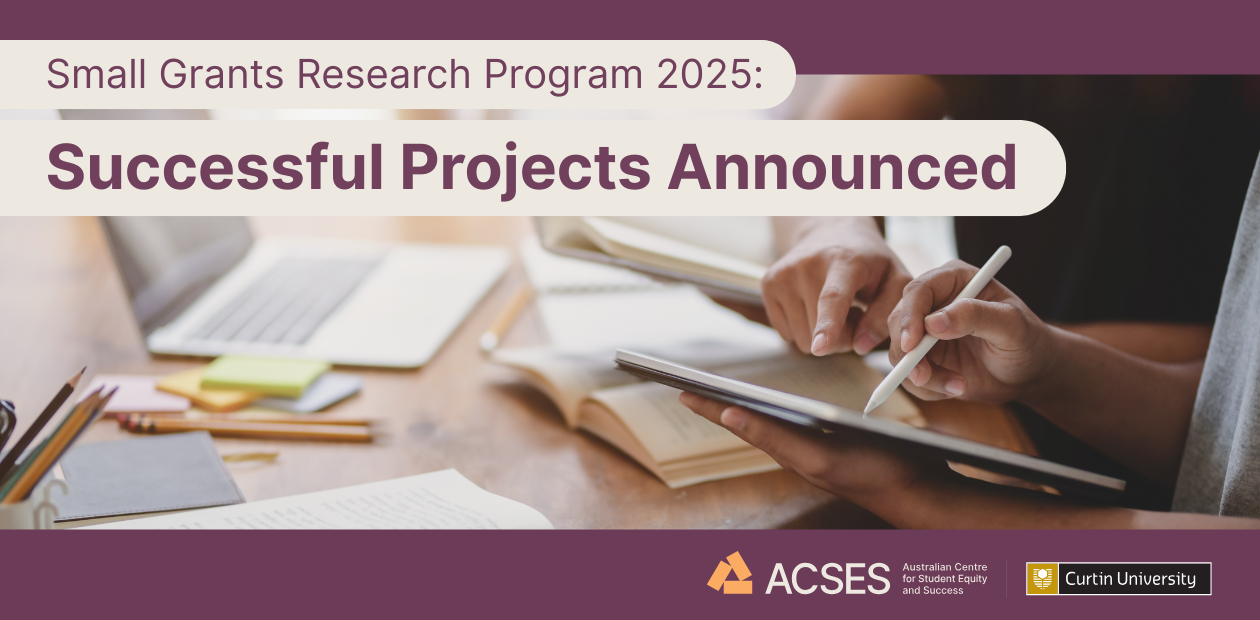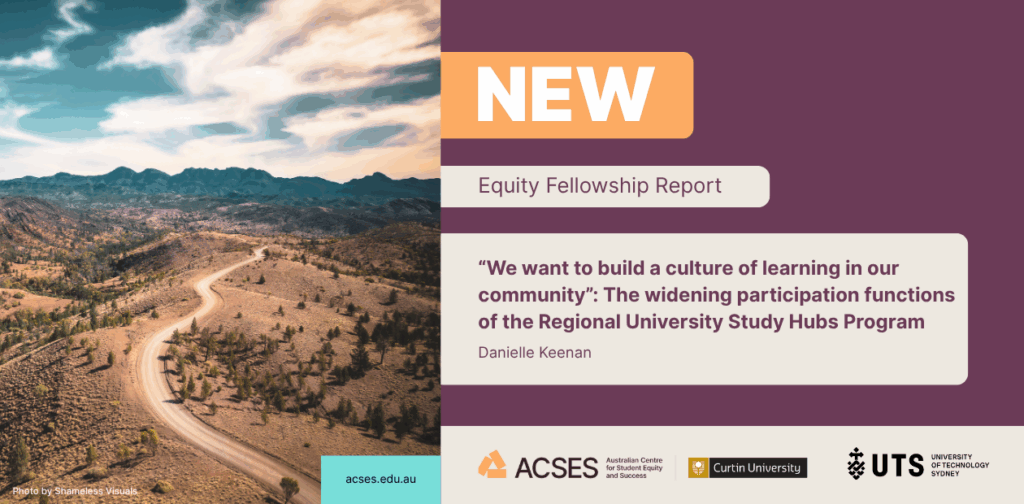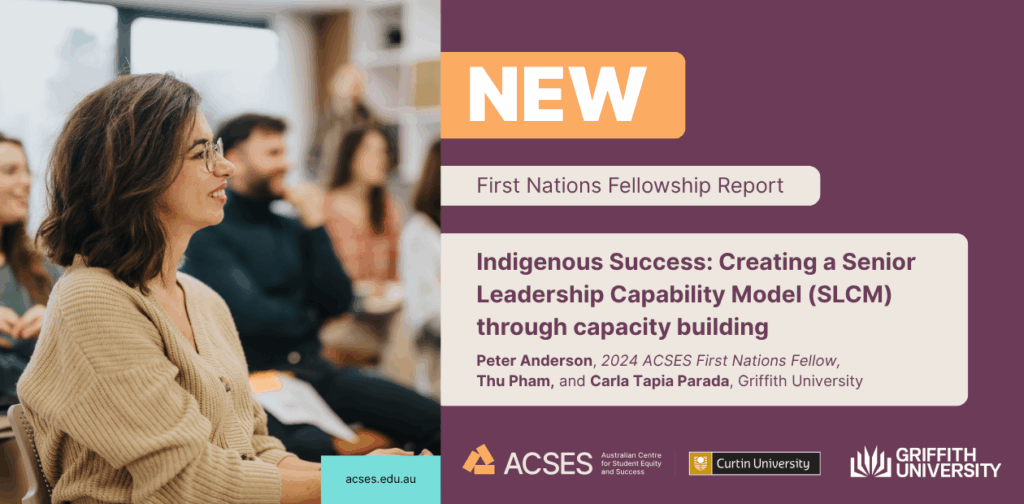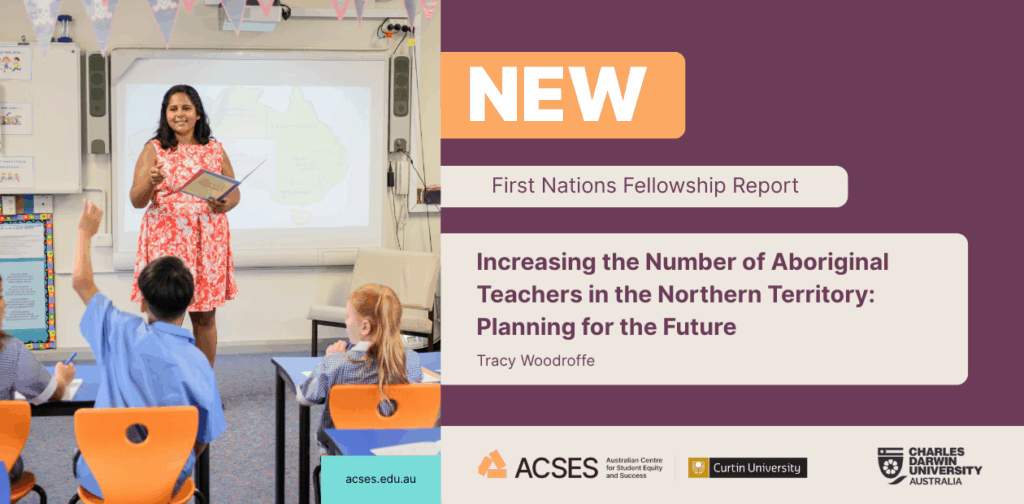The Australian Centre for Student Equity and Success (ACSES) is pleased to announce 10 proposals have been selected for funding as part of ACSES’s Small Grants Research Program, for a total funding amount of AUD493,426.
This year, the Centre received 19 applications in total, which were assessed by ACSES’s Grants and Fellowships Committee and Dr Francis Markham (Australian National University), who served on the Small Grants Selection Panel.
ACSES is pleased to announce the successful projects and recipients:
Predicting health and wellbeing effects on Indigenous students’ completion rates
Lead institution: Griffith University
Lead researcher: Dr Thu Dinh Xuan Pham
Project abstract: This project investigates how health and wellbeing affect Indigenous students’ completion rates in Australian higher education. Building on the validated Higher Education Success Factor model, which identified health and wellbeing linked to withdrawal intention, this study explores specific risk factors, including mental health issues, isolation, stress, and depression, to predict the likelihood of withdrawal. It also examines enablers such as resilience, connectedness, positive psychology, accessibility to mental health services, and institutional support that are crucial in helping students remain in their program to completion. Using a mixed-methods design, we will survey Indigenous graduates (2018 – 2024) who completed a B.A/M.A/PhD degree and conduct interviews to explore their lived experiences of wellbeing during study. Quantitative data will be analysed using logistic regression in R to predict the probability of withdrawal linked to health and wellbeing. As the first of its kind, we will develop a predictive model to inform early interventions and institutional strategies, offering actionable insights to enhance Indigenous student success.
Counting the costs: Investigating how low SES students make financial decisions about study
Lead institution: Charles Sturt University
Lead researcher: Dr Maree Martinussen
Project abstract: Financial hardship significantly shapes the experiences of students from low SES backgrounds. While policy often assumes that decisions are made through clear cost–benefit reasoning, this overlooks uneven access to financial information and the ways affordability is interpreted in everyday life. This project examines how low SES students engage with the financial dimensions of higher education across the access and early participation stages, specifically, enabling education and first year.
Drawing on surveys and interviews with students at metropolitan and regional universities—alongside interviews with enabling educators and university financial counsellors—the project investigates: (1) what students know and believe about study costs and supports; (2) how they assess risk, interpret affordability, and manage trade-offs under constraint; and (3) how trust, stigma, and confidence shape support-seeking behaviour. Outputs will include a visual model of financial reasoning and risk moments, and guidance for equity practitioners and policymakers. These will help move beyond one-size-fits-all models toward more context-sensitive approaches to student financial decision-making.
Enhancing regional First Nations researcher development through the Manna Institute First Nations Network
Lead institution: Manna Institute, University of New England
Lead researcher: Ms Kisani Upward
Project abstract: Higher education systems widely acknowledge the essential need to embed the cultural, spiritual, and educational practices of First Nations people. This project is informed by First Nations research methodologies and initiated, led, and governed by the Manna Institute First Nations Advisory Group. We seek to explore the feasibility of the Manna Institute First Nations Network, a community digital platform, and a collaborative initiative across seven regional Universities. Through First Nations community participatory research methods, we will assess the feasibility of the Network among First Nations researchers and HDR students in regional Universities. We aim to foster connectivity, support, and interdisciplinary collaboration among First Nations early career researchers across regional University settings. We will ensure strong and sustained engagement, provide tailored and specific training and development for the First Nations academic community, and incorporate First Nations knowledges and approaches throughout the higher education system. We will empower future Indigenous leaders, integrate cultural knowledge into national research agendas, and ensure long-term institutional relevance in a changing Australia.
Setbacks, challenges, and attrition: Understanding student progress in FFUR programs
Lead institution: James Cook University
Lead researcher: Dr Matthew Bunn
Project abstract: FEE-FREE Uni Ready (FFUR) programs, known also as enabling or pathways programs, are an important mechanism for supporting students who have experienced social and educational disadvantage to gain access to undergraduate study. These programs are known to have high attrition rates, though there are no clear nationwide figures. There is little research into this problem and no public data available. This project examines students who fail or withdraw from subjects during a FFUR program and the impact this has on their progression into undergraduate study. We use failure or withdrawal from subjects as a proxy for student difficulties and setbacks. The project will utilise a cross-institutional mixed methods methodology, drawing from institutional data and qualitative in-depth interviews with current FFUR program students. The project will examine whether failing and withdrawing subjects are accurate predictors of student attrition. The project will also provide qualitative insight into the cumulative and compounded aspects of students’ experiences that lead to setbacks in their studies.
Co-designing equity: Neuroinclusive assessment and placement for allied health students
Lead institution: The University of Newcastle
Lead researcher: Dr Rebecca Collins
Project abstract: Despite increased equity awareness and policies, neurodivergent (ND) students still face systemic higher education barriers, including the evaluation of learning. Assessments and professional placements across the lifecycle of allied health programs can be rigid, and lack lived-experience input from ND students. This project addresses gaps between equity/accessibility intent and evaluation practices in allied health programs via investigation and co-design of neuroinclusive assessment and professional placement strategies across allied health programs, centering ND students and real-world needs. The methodology encompasses:
- Audit discipline specific current assessment/placement practices for neuroinclusivity.
- Survey ND students and clinical educators to identify assessment/placement barriers.
- Partner with paid ND student consultants to co-design neuroinclusive assessment/placement frameworks.
- From consultancy outcomes propose equitable adjustments to improve assessment/placement accessibility for ND students and deliver a scalable, student-designed assessment and placement environment toolkit
This project will model how student consultation can transition from traditional method compliance to empowerment, leveraging lived experience to drive systemic changes in higher education.
Wellbeing, coping, and supports among low SES students during placement
Lead institution: Griffith University
Lead researcher: Dr Lauren Terzis
Project abstract: This research investigates barriers to equitable participation in higher education for low socioeconomic status (SES) students during mandatory work-integrated learning (WIL) placements, essential for professional accreditation yet often exacerbating financial, emotional, and logistical burdens. These challenges disproportionately impact low SES students, leading to placement deferrals, reduced academic performance, and diminished wellbeing. Focusing on social work students experiencing cumulative disadvantage, this project aims to advance student equity by exploring wellbeing challenges and coping strategies using a mixed-methods approach. Quantitative data will assess wellbeing indicators, while qualitative focus groups will capture lived experiences of placement stress, support access, and unique coping strategies. Secondary data on placement deferrals, particularly the Commonwealth Prac Payment’s (CPP) impact, will be analysed. Findings will directly inform the development and implementation of a strengths-based, equity-focused workshop series to enhance resilience, wellbeing, support, access, and placement outcomes for low SES students. Aligning with ACSES priorities, this study promotes access, participation, and success for priority student equity groups.
Does the Commonwealth Prac Payment meet its equity aims?
Lead institution: The University of Newcastle
Lead researcher: Dr Julia Cook
Project abstract: In response to Recommendation 14 from the Australian Universities Accord Final Report the Australian government will introduce a Commonwealth Prac Payment (CPP) from July 2025 for students undertaking mandatory practicum placements in teaching, social work, nursing and midwifery. This payment is intended to alleviate placement poverty, which disproportionately impacts those from priority student groups. However, student advocacy groups across the affected disciplines have raised concerns about the strict conditions of access to this payment. This project will assess the first year of the CPP, focusing particularly on whether it is alleviating placement poverty for those in priority student groups. Using a broad-based survey and innovative qualitative methods this project will walk alongside placement students to foreground their lived experiences. We aim to identify whether the CPP is achieving its aim of removing financial barriers to participation in higher education and, if necessary, to provide recommendations on how it can better do so, and how practitioners can support students to access it.
Low SES students’ non-ATAR access: Barriers in VIC and WA
Lead institution: Victoria University
Lead researchers: Dr Binh Ta and Dr Sam Hoang
Project abstract: This study investigates the institutional and systemic barriers faced by low socioeconomic status students (SES) who enter bachelor’s degrees via non-ATAR pathways in Victoria and Western Australia, two states with contrasting secondary education systems and different rates of non-ATAR admissions. While non-ATAR pathways are central to equity and widening participation agendas, their effectiveness depends on how they are implemented and supported at both state and institutional levels.
Adopting a qualitative, comparative approach, the project investigates how research-intensive, teaching-focused, and regional universities respond to the needs of low SES non-ATAR students. It draws on in-depth interviews with students to understand their lived experiences, and with staff to uncover institutional practices and perceptions. Policy documents and existing data will be analysed to examine jurisdictional policies and contextualise equity strategies and outcomes. The findings will offer valuable insights into how education systems and university types shape student experiences, providing evidence to inform policy development and institutional strategies for inclusive and equitable higher education.
Exploring equity students’ use of AI in higher education
Lead institution: Deakin University
Lead researcher: Dr Reza Kachouie
Project abstract: This exploratory project investigates how equity students, specifically those from low socio-economic (SES), regional and remote, first-in-family, and culturally and linguistically diverse (CALD) backgrounds, engage with artificial intelligence (AI) tools in Australian higher education. While AI adoption is rapidly transforming learning, research, and industry, the perspectives and practices of equity students remain largely overlooked in current discourse. This project addresses that gap by exploring how these students adopt AI technologies, their expectations, perceived challenges, and learning needs. Using semi-structured interviews, focus groups, and participatory workshops, the study will develop conceptual models and ethical design principles to inform inclusive teaching practices and guide future AI-related research. Aligned with the Australian Universities Accord’s vision of “skills through equity,” the project aims to build foundational knowledge for equity-informed digital learning strategies. Outcomes will include a typology of AI user experiences, a conceptual framework for inclusive AI use in education, and a white paper to inform curriculum design, sector policy, and future tool development.
Widening participation in undergraduate fieldwork through equitable design
Lead institution: University of Tasmania
Lead researcher: Dr Lizzie Wandrag
Project abstract: Fieldwork offers powerful opportunities for learning, identity formation, and engagement with place and Country, yet access to these experiences remains uneven across the Australian higher education sector. This project addresses a critical gap by investigating how structural and pedagogical barriers shape participation in undergraduate field-based units. Anchored at the University of Tasmania and in collaboration with researchers at the University of Western Australia – Albany and Edith Cowan University, the project focuses on institutions with high representation of regional and/or remote, low SES, and diverse student cohorts. We will audit participation and curriculum design across multiple field units, benchmark inclusive teaching practices against international exemplars, and co-design methodologies to support inclusive fieldwork delivery. Outputs will include a benchmarking framework, inclusive curriculum guidelines, and a self-assessment tool for fieldwork coordinators. By embedding global evidence into the Australian context, the project will support more inclusive, place-based learning and lay the foundation for broader reform in environmental and field-based education.
ACSES thanks all the applicants for their research proposals and the Grants and Fellowships Committee for its work.





